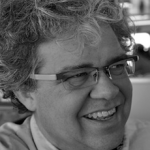EPIC
Perspectives
Luis Arnal / A Profile
Jennifer Collier Jennings

News
EPIC is Our Community
Jennifer Collier Jennings • 0 Comments
Maria Bezaitis, EPIC Board President I entered the field of applied ethnography in the mid-90s. For me the point was never about practicing my academic training, or having a career that academia couldn’t provide. The point was always about who I got to work with and the dynamism we experienced doing the work because we…
Perspectives
ken anderson / A Profile
Jennifer Collier Jennings

Perspectives
Maria Bezaitis / A Profile
Jennifer Collier Jennings

Intelligences
The EPIC 2014 Conversation
Jennifer Collier Jennings • 0 Comments
Perspectives
Accounting for Value Salon at EPIC2014
Jennifer Collier Jennings
News
History Matters
EPIC People • 0 Comments
By Maria Bezaitis, Alex Mack, and ken anderson The EPIC Proceedings are a history of people, ideas, arguments, and conversations. While the proceedings are not an exhaustive representation of who we are, what we work on, how we think, they provide an important view into precisely these facets of the EPIC community. At the NYC conference…
Ask EPIC
What were the suggested readings for Epistemology/Reductionism Salon at EPIC2014?
Jennifer Collier Jennings • 0 Comments
List of suggested readings from Neal Patel Fricke, Tom E. 2003 “Culture and Causality: An Anthropological Comment.” Population and Development Review, 29(3): 470-479. Madsbjerg, Christian and Mikkel B. Rasmussen 2014 “An Anthropologist Walks into a Bar . . .” Harvard Business Review, March. (Available at: http://faculty.elgin.edu/mhealy/HBRAnthropology.pdf) Shea, Jeanne L. 2003 “Setting the Anthropological Record Straight: Critique…
